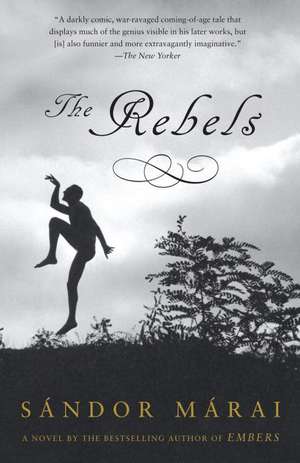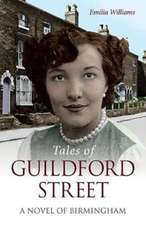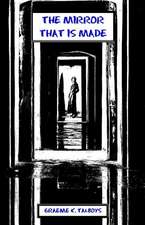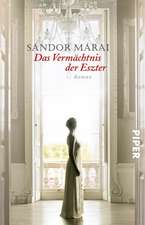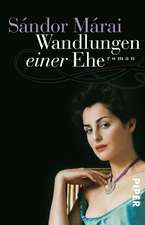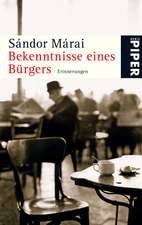The Rebels
Autor Sandor Marai Traducere de George Szirtesen Limba Engleză Paperback – 29 feb 2008
It is the summer of 1918, and four boys approaching graduation are living in a ghost town bereft of fathers, uncles, and older brothers, who are off fighting at the front. The boys know they will very soon be sent to join their elders, and in their final weeks of freedom they begin acting out their frustrations and fears in a series of subversive games and petty thefts. But when they attract the attention of a stranger in town—an actor with a traveling theater company—their games, and their lives, begin to move in a direction they could not have predicted and cannot control, and one that reveals them to be strangers to one another. Resisting and defying adulthood, they find themselves still subject to its baffling power even in their attempted rebellion.
| Toate formatele și edițiile | Preț | Express |
|---|---|---|
| Paperback (2) | 63.63 lei 6-8 săpt. | |
| Vintage Books USA – 29 feb 2008 | 85.16 lei 3-5 săpt. | |
| PICADOR – aug 2013 | 63.63 lei 6-8 săpt. |
Preț: 85.16 lei
Nou
Puncte Express: 128
Preț estimativ în valută:
16.30€ • 17.43$ • 13.59£
16.30€ • 17.43$ • 13.59£
Carte disponibilă
Livrare economică 28 martie-11 aprilie
Preluare comenzi: 021 569.72.76
Specificații
ISBN-13: 9780375707414
ISBN-10: 0375707417
Pagini: 278
Dimensiuni: 141 x 202 x 16 mm
Greutate: 0.21 kg
Editura: Vintage Books USA
ISBN-10: 0375707417
Pagini: 278
Dimensiuni: 141 x 202 x 16 mm
Greutate: 0.21 kg
Editura: Vintage Books USA
Notă biografică
Sandor Marai was born in Kassa, in the Austro-Hungarian Empire, in 1900, and died in San Diego, California, in 1989. He rose to fame as one of the leading literary novelists in Hungary in the 1930s. Profoundly antifascist, he survived World War II, but persecution by the Communists drove him from the country in 1948. He went into exile, first in Italy, then in the United States.
Extras
The actor had arrived in town with the company in the early autumn, saying he had had a contract in the capital first, but the theater had closed. He was forty-five years old but claimed to be thirty-five. Not even the gang believed this though they eagerly swallowed everything else he told them. He tended to play comic, dancing roles but referred to himself as a ballet instructor. The contract laid down that the company was obliged to supply divas and leading men each season for a few highlights from popular operettas. It was the comedian dancer’s task to teach them the appropriate elements of ballet.
He had put on weight, developing a proper paunch and jowls, a rare thing in the world of comedians and dancers. The audience liked him because he included a lot of current gossip in his act. He wore a wig of light chestnut color. His head was large and equine. His jaw was thrust forward and he was so near-sighted that he couldn’t see the prompter’s box, but he refused to wear glasses out of vanity, not even in real life, as he put it.
His stage name was Amadé: Amadé Volpay was how they billed him. He spoke with his mouth full as if chewing on a dumpling. He wore generously fitting, light suits that skillfully disguised his fatness as did his corset that was laced so tightly when he was on stage that his face was practically red, so that he didn’t look half as fat as he did in life. It was as if his girth were no more than some kind of misapprehension that existed between him and the world at large, and he never ceased talking about it. He spoke eloquently and at length to both intimates and strangers in the effort to persuade them that he was not fat. He produced precise measurements and medical tables showing average proportions to prove he was as slender as a flamingo and that his figure was in all respects the manly ideal, his belly swelling as he did so because, in his passion, he forgot to hold it in.
Bearing this in mind he would walk down the street like a ballet dancer, practically mincing. He propelled his substantial body along on points, with delicate, genuinely airy steps, as if it weighed nothing, as if he feared being blown away by the next gust of wind. He always shaved his jowls to the same dazzling pale blue sheen. He would then apply powders and creams to them, and arrange them carefully in the space allowed by his folded-over collar as if they were a discrete and separate part of his body. Occasionally he would touch them tenderly with his short, pudgy, remarkably pale fingers to check that nothing was awry, that everything was where it ought to be.
The actor spent all day on the street, on the most frequented stretch of the high street, between the church and the café, from which he could keep an eye on the side entrance to the theater. You could see him there at all hours, patrolling up and down, usually holding forth and surrounded by a gaggle of people. It was only after supper that he retreated to the middle picture window of the café where anyone passing was obliged to acknowledge his presence and from which position he, in his turn, could keep track of everyone. He didn’t play cards. He didn’t drink. He appeared to avoid his fellow actors. His clothes carried the sweet but choking smell of cinnamon. It was this smell that emanated from him to the outside so that anyone passing him would know that Amadé Volpay was around.
He wore two rings on his fleshy fingers, one signet ring with a red stone and a wedding ring. He never denied that he was Jewish and unmarried. The rings were only for show.
From the Hardcover edition.
He had put on weight, developing a proper paunch and jowls, a rare thing in the world of comedians and dancers. The audience liked him because he included a lot of current gossip in his act. He wore a wig of light chestnut color. His head was large and equine. His jaw was thrust forward and he was so near-sighted that he couldn’t see the prompter’s box, but he refused to wear glasses out of vanity, not even in real life, as he put it.
His stage name was Amadé: Amadé Volpay was how they billed him. He spoke with his mouth full as if chewing on a dumpling. He wore generously fitting, light suits that skillfully disguised his fatness as did his corset that was laced so tightly when he was on stage that his face was practically red, so that he didn’t look half as fat as he did in life. It was as if his girth were no more than some kind of misapprehension that existed between him and the world at large, and he never ceased talking about it. He spoke eloquently and at length to both intimates and strangers in the effort to persuade them that he was not fat. He produced precise measurements and medical tables showing average proportions to prove he was as slender as a flamingo and that his figure was in all respects the manly ideal, his belly swelling as he did so because, in his passion, he forgot to hold it in.
Bearing this in mind he would walk down the street like a ballet dancer, practically mincing. He propelled his substantial body along on points, with delicate, genuinely airy steps, as if it weighed nothing, as if he feared being blown away by the next gust of wind. He always shaved his jowls to the same dazzling pale blue sheen. He would then apply powders and creams to them, and arrange them carefully in the space allowed by his folded-over collar as if they were a discrete and separate part of his body. Occasionally he would touch them tenderly with his short, pudgy, remarkably pale fingers to check that nothing was awry, that everything was where it ought to be.
The actor spent all day on the street, on the most frequented stretch of the high street, between the church and the café, from which he could keep an eye on the side entrance to the theater. You could see him there at all hours, patrolling up and down, usually holding forth and surrounded by a gaggle of people. It was only after supper that he retreated to the middle picture window of the café where anyone passing was obliged to acknowledge his presence and from which position he, in his turn, could keep track of everyone. He didn’t play cards. He didn’t drink. He appeared to avoid his fellow actors. His clothes carried the sweet but choking smell of cinnamon. It was this smell that emanated from him to the outside so that anyone passing him would know that Amadé Volpay was around.
He wore two rings on his fleshy fingers, one signet ring with a red stone and a wedding ring. He never denied that he was Jewish and unmarried. The rings were only for show.
From the Hardcover edition.
Recenzii
“A darkly comic, war-ravaged coming-of-age tale that displays much of the genius visible in his later works, but [is] also funnier and more extravagantly imaginative.” —The New Yorker
“The emotional power of the story is that of a simple, straightforward narrative . . . followed by stunning revelation.” —The Boston Globe
“A morbidly comic novel . . . marked by passages of bleak elegiac grandeur.” —The New York Sun
“The emotional power of the story is that of a simple, straightforward narrative . . . followed by stunning revelation.” —The Boston Globe
“A morbidly comic novel . . . marked by passages of bleak elegiac grandeur.” —The New York Sun
Descriere
Descriere de la o altă ediție sau format:
From the author of the bestselling Embers, a haunting, powerful tale of innocence threatened by war.
From the author of the bestselling Embers, a haunting, powerful tale of innocence threatened by war.
